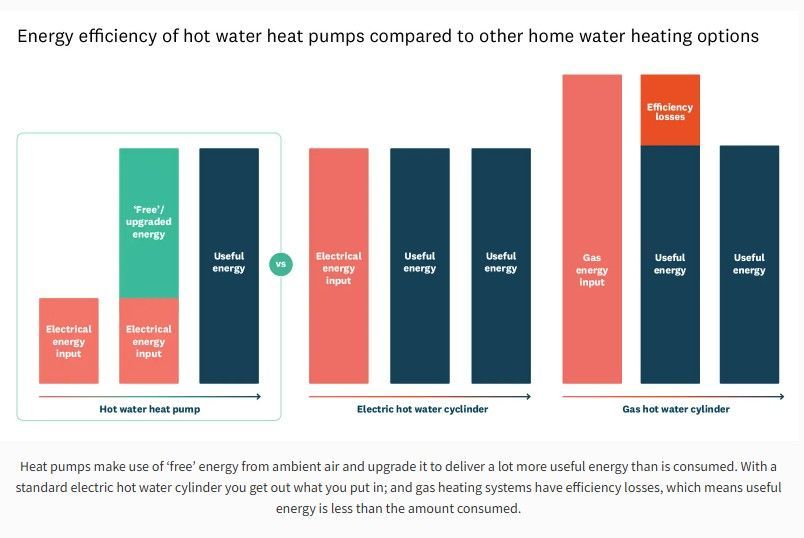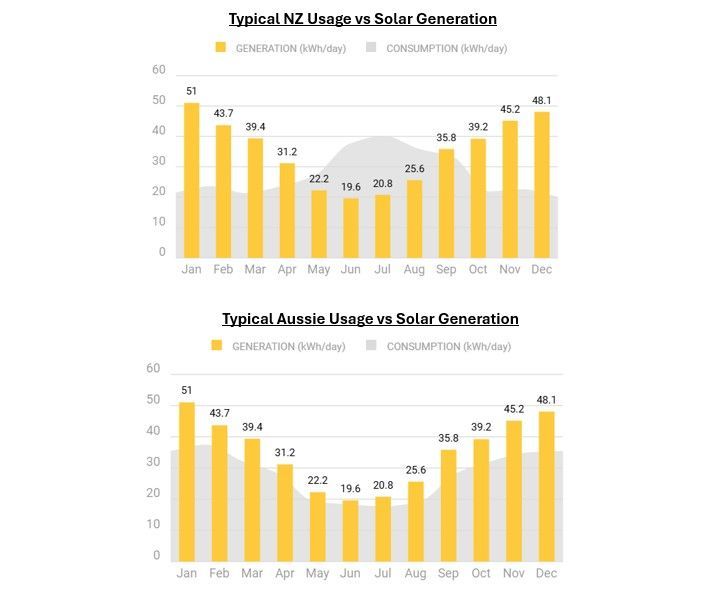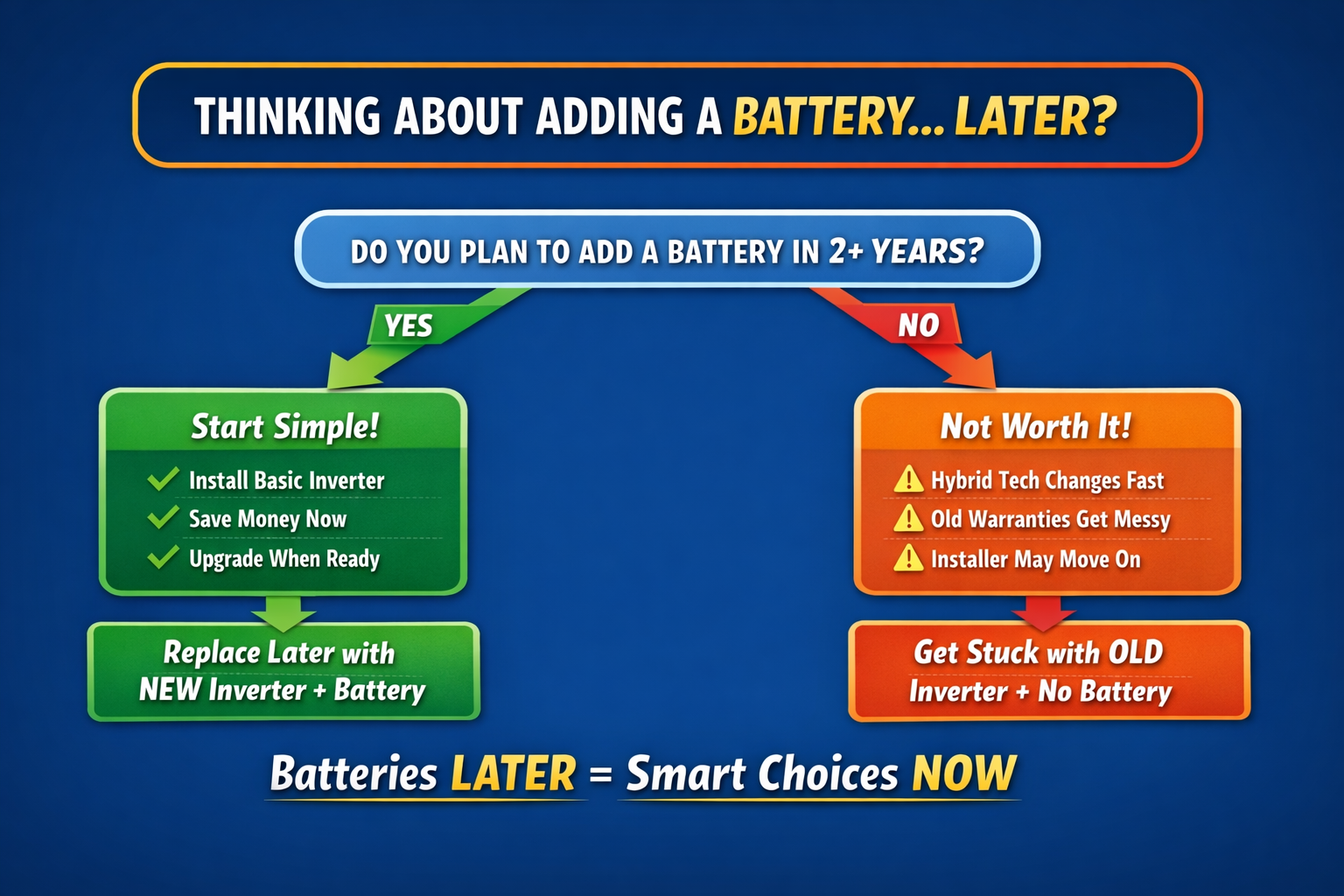From Gas to Solar: Should You Go Traditional Cylinder or Heat Pump for Your Hot Water?

If you're still on gas for hot water, you're in a pretty common spot. But now you’re weighing your switch options — traditional electric cylinder with solar vs a shiny new heat pump cylinder. Which one actually makes sense in the long run?
Here’s the brutal, no-fluff breakdown — from someone who’s thought about this way too much.
The short summary is; most homes don't have the perfect roof for winter solar production. So; most homes should get a heat pump hot water cylinder. But for those who have a stunning north facing roof, a traditional cylinder + an extra 6 - 10 more panels is the way to go.
🔍 What EECA Actually Says About Heat Pump Cylinders
- Heat pump water heaters use a vapour-compression cycle to pull heat from the air and transfer it to your water. It’s clever. EECA
- According to EECA, they typically use 60–75% less electricity than a standard electric cylinder — and are cheaper to run than gas over time. EECA
- But: they come with a higher upfront cost, and their lifespan is shorter — generally between 8 and 15 years, because of all the extra mechanical parts. EECA
- They can also be a bit less efficient in colder outdoor air — when it’s freezing, that heat pump has to work harder. EECA
💡 Why Traditional + Solar Is Often the Smarter Long-Term Play (Especially for Solar-Optimised Homes)
If you’ve got a north-facing roof at a good pitch (20° or more), here’s where the math gets fun:
- Add more panels, not a heat pump.
Tacking 10 more panels equate to another 4.5 - 5kW of solar panels. Adding them onto your typical 12 panel quote costs roughly the difference between a traditional and a heat pump cylinder. ($6,000 ish).
Those 10 panels will produce the 3kW your cylinder needs on most days, even with a little cloud. And on a dark day, they'll still generate enough to power about half of the traditional cylinders energy demand. - Longevity is on your side
Traditional cylinders + well-installed solar systems can easily last 25–30 years. Heat pump cylinders? Likely need replacement after 12–15 years. That means another big bill down the line. - Lower maintenance risk
Fewer moving parts, fewer failure points. On the contrary, Heat Pump Cylinders need maintenance every few years to ensure their warranty is honoured. The sacrificial anode must be replaced every 4– 5 years to extend the cylinder’s life — but unless you’re a licensed plumber, you legally can't do it yourself. So the ‘cheap maintenance’ argument for heat pump cylinders often forgets the bit where you’re calling a plumber anyway. - Better alignment with solar
With solar powering a traditional cylinder, you’re storing your sunshine in hot water. Over time, that’s gold. Whereas a heat pump draws consistent power and is less able to flex with variable solar generation.
⚠️ When a Heat Pump Could Be The Smart Choice
- You use a LOT of hot water — big family, long showers, high demand. The efficiency gains from a heat pump start to make real sense.
- You've got a small roof - because if you can't fit the extra panels, get the heat pump cylinder!
- Your roof is under 20 degrees, and / or isn't facing mostly north - because anything but 20+ degrees north performs poorly in winter, which means high winter bills. Better to go with a heat pump cylinder and have guaranteed & low cost water heating.
- You don’t mind replacing gear — if you're okay with swapping out the unit in 10-ish years, the savings during its life could justify it.
- Space + noise work for you — because of the fan & compressor, your heat pump will need to live outside or somewhere it won’t annoy the neighbours. EECA
🔭 The Long-Term Betting Strategy (From Your Friendly Solar Broker)
Here’s our take (and yes — there’s a strategy):
- If your roof is solar-friendly (north-facing, decent pitch), lean into traditional cylinder + solar. Use your panels to power that cylinder, and let it run happily for decades.
- Don’t be tempted to spend on a heat pump unless you’ve run the numbers with all-in costs (buy, install, maintain, replace).
- If you go heat pump, make sure someone has correctly sized it to match how much hot water you actually use. Too big or too small, and the maths breaks.
- Remember: your solar system is one of your best long-term bets. It’s not flashy, but it’s steady, reliable, and built to last.
🍟 Some options to consider - just an indication
Consider these:
- 12 panels installed + a good quality heat pump hot water system: $21,000
*The heat pump cylinder will likely need replacing around year 15, and it will need maintenance every 5 years. - 22 panels installed + a traditional heat pump cylinder: $21,000
*Both the panels and the cylinder are likely to last 30 years.
Same price. Similar outcome on your power bills, but a very different story once you factor in replacement and maintenance costs.
✅ Final Verdict
For most former-gas households with good solar potential, adding panels + a traditional hot water cylinder is going to pay off bigger, longer, and with less headache than jumping into a heat pump setup + a smaller solar system.
Some solar companies don't like our position on this. But just think for yourself, and ask, how many old homes in NZ are still running traditional hot water cylinders from the 90s?
Heat pumps are sexy, efficient, and “green.” But if you want long-term stability, fewer moving parts, and a system that just works — the old-school storage cylinder, powered by sunshine, (and a few more solar panels), often wins.
PS: Already got a traditional cylinder? Read our blog about your smart solar & hot water options.



